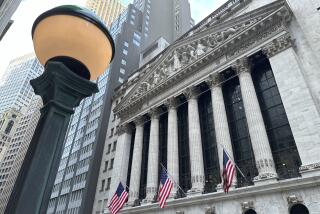Global stock sell-off is a big test of U.S. economy’s resiliency

Reporting from washington — A frenzied sell-off in international financial markets Monday heightened anxiety about the global economy, sending officials at central banks around the world looking urgently for ways to ease the latest bout of shocks and keep their economies from sliding further.
Though the U.S. economy has been healthy, the recent volatility in stock and bond markets — along with the slowing Chinese economy, a weak Europe and unease about emerging markets — has raised alarm bells in world capitals about what might come next.
One potentially major impact in the U.S. will be the Federal Reserve’s plan to raise interest rates as soon as next month. Amid the uncertainty and instability, that move is almost certain to be delayed.
The larger question is whether it will be enough to keep the U.S. economy’s steady, if historically moderate, growth on track.
China has been the main culprit in the recent stock market swoon, and the Shanghai composite index opened down 6.4% Tuesday. Even if China’s slowdown sends other nations into an economic downturn, the U.S. appears better positioned to weather the storm — at least up to a certain point.
Various data show an American economy expanding with solid fundamentals: Job growth has been sturdy, corporations are sitting on piles of cash, and household debt burdens are at their lowest in decades. Many experts are confident China’s woes won’t derail the 6-year-old recovery of the U.S. economy, which is more diverse and can rely on its large domestic market.
On the other hand, the current growth cycle, now in its seventh year, is already longer than the average for a recovery. And what at times Monday resembled panic selling of stocks — with the Dow Jones industrial average down more than 1,000 points initially before recovering to a loss of 588.40 points for the day — suggests a nervousness not seen since the financial crisis of 2008.
“At this stage, it’s just a full-blown panic,” said Chris Rupkey, chief financial economist at the Bank of Tokyo-Mitsubishi in New York. “It’s a very dangerous sell-off … with a potentially very powerful downward effect dampening confidence among businesses and consumers that can stop an economy on its tracks.”
The Federal Reserve could help ease the nervousness by delaying a long-anticipated — some would say feared — interest rate hike that had looked very likely to come next month.
But with stocks dropping the last two weeks, economists and investors have largely thrown away their bets that the Fed will announce a rate increase at the end of its meeting Sept. 17.
“It’s not going to happen in September, and December is a stretch,” said Diane Swonk, chief economist at Chicago-based Mesirow Financial, who for weeks had put the odds of a September rate increase at 75%.
Swonk said the central bank could telegraph a rate-hike delay at a Fed conference later this week to help settle down global markets. Chinese officials, meanwhile, are looking at a fresh injection of liquidity to boost bank lending in a bid to shore up confidence.
But it remains to be seen what governments and central banks can do. The U.S. Treasury Department said Monday that it was “monitoring ongoing market developments and is in regular communication with its regulatory partners and market participants.”
During a smaller market turmoil in 2011, the Fed essentially rode to the rescue by announcing a bond-purchase stimulus that helped restore confidence, but the central bank has been preparing to tighten monetary policy, not loosen it. And a big reversal in its plans might only stoke more fears that the global economy is in serious trouble.
“There is no one out there to blow the whistle and say [to stock sellers], ‘Everybody get out of the pool,’” Rupkey said. The U.S. economy may be solid, he said, but at the moment, “perception is driving the selling, reality isn’t.”
NEWSLETTER: Get the day’s top headlines from Times Editor Davan Maharaj >>
The perception, or fear, has been intensified because a lack of transparency makes it especially hard to gauge the magnitude of China’s slowdown. Beijing has been trying to restructure its economy from exports to one relying more on domestic consumption and services, but a bursting of a Chinese stock market bubble and a sudden currency devaluation two weeks ago highlighted the vulnerabilities of the world’s second-largest economy.
And Beijing’s usual control mechanisms have failed to contain the chaos, raising fresh doubts about China’s ability to prevent a hard landing.
With China being the biggest buyer of copper, iron and other metals, and the second-largest consumer of oil after the U.S., the uncertainty surrounding its slowdown has sent commodity prices spiraling down, prompting growing worries about the impact to economies that rely heavily on selling things dug up from the earth. These include countries such as Australia, Indonesia, Chile and Brazil, which have seen a sharp and sudden reversal of fortunes after years of cashing in on China’s boom.
Now, China’s devaluation of the yuan has raised the specter that some emerging nations will join Vietnam in lowering their currencies in order to compete for exports at a time when global trade is weakening.
The slowing of China and emerging economies has been taking place for months now, and the likelihood of a Fed rate increase this year had already hurt their currencies and resulted in a flight of capital to the U.S. But the recent stock market turmoil has increased worries that this global economic transition — in which growth must now depend on rich economies, not developing nations — will be bumpy.
For the last several years, with Japan and much of Europe in the throes of a slump, global economic growth has been driven mostly by China and the U.S. What many are asking now is: If China slows sharply, can the U.S. weather better than others?
Most experts think it can. The U.S. economy’s direct exposure to China is relatively minor. American exports to China amount to about 1% of the U.S. economy. Although American companies produce goods in China for that market and elsewhere around the world, many have continued to make profits in China, albeit with more difficulties.
Later this week, the government is expected to report that the U.S. economy grew at a healthy pace of about 3% in the second quarter after sluggish activity in the winter. Although the current quarter is looking somewhat weaker, most economists say there’s still plenty of steam left in the current expansion.
“It’s not fantastic,” said Paul Ashworth, an economist at Capital Economics, but what’s happened in the markets is “far beyond justification based on economic fundamentals.”
What’s more, there is also a silver lining in the recent global tumult. The resulting fall in oil prices, at a fresh six-year low, will mean lower costs for American motorists, which in turn will put more money in consumer pockets to buy other things.
Also softening the hit from the stock market plunge is that fewer Americans own stocks today than during the financial crisis, said Swonk of Mesirow Financial. For most households, home values matter a lot more, she said, and prices have been moving in the right direction.
“There are many reasons to be optimistic that we will weather this storm,” she said. “I think we’ll be battered, but we won’t be beaten.”
Even so, each day financial markets slump, the greater the risk that it will damage the real economy.
Josh Feinman, managing director at Deutsche Asset Management in New York, agreed that he didn’t “see anything major having changed on the U.S. economic front, certainly nothing that would explain the sell-off in the domestic markets.”
But he noted that financial conditions have already tightened, meaning lending and borrowing have become more difficult.
“There are definitely risks,” he said. “The irony here is that markets are selling off because they’re worried about the economic impact and [in doing so] may be creating a self-fulfilling prophecy.”
MORE ON THE STOCK MARKET PLUNGE
Big losses on Wall Street leave investors wondering what’s next
China’s market meltdown triggers global sell-off; Shanghai exchange falls about 8.5%
How the global economic turmoil will play out in the U.S.
More to Read
Inside the business of entertainment
The Wide Shot brings you news, analysis and insights on everything from streaming wars to production — and what it all means for the future.
You may occasionally receive promotional content from the Los Angeles Times.











